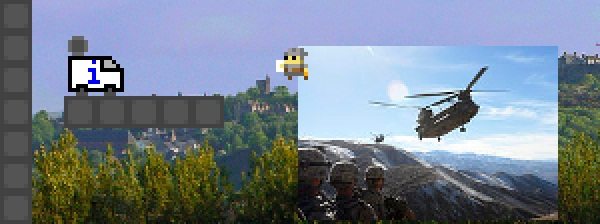EGX Rezzed: ANGELINA, the video game making AI
What does it take to be a game developer?
Turns out nothing more than an intelligent computer. At this year’s EGX Rezzed in Birmingham, Computer Science PhD researcher Michael Cook gave a presentation on his research project: an artificial intelligence called ANGELINA that specialised in automated game design.
For a coding simpleton like me, it’s difficult enough to picture a band of talented game developers working day and night, so surely this was a monumental leap forward in the gaming industry? Cook quickly put those eager faces to quick rest by laying claim to ANGELINA’s most significant achievement: 500th place at an obscure independent games festival. Even if I wasn’t bearing witness to the next gaming revolution, ANGELINA was still incredibly intriguing.
ANGELINA (which stands for ‘A Novel Game Evolving Labrat I’ve Named Angelina’) began with simple 2D games – designing rule sets, creating level layouts, placing obstructions in various places. It eventually graduated to quirky politics based side-scrolling platformers derived from Guardian articles, one hilariously titled The Goose that Laid the Golden Clegg that illustrated the turmoil between the liberal democrats and conservative party.
And after this series of bizarre games, Cook explained his fascination with trying to design an AI that could itself design games with meaning about the stuff it portrays. This led to the demonstration of a game called To That Sect. ANGELINA made this 3D game based on simple cues of eeriness and the word ‘one’. It chose unsettling music; it placed cult-based statuettes as the enemies and rather absurdly decided to let the player collect model ships instead of coins or rings.
Cook brings up a tough question: can computers be creative? His and ANGELINA’s games definitely deal promise in this respect but the deep-seated flair and natural talent from an endless team of human coders, art designers, composers et al. can’t be easily overlooked in favour of a barrage of ones and zeroes. But can the same game be made more than once? Cook retorts that nobody asked Picasso to paint the same picture twice, explaining that ANGELINA wouldn’t create the exact same game based on the same cues but the overall ‘flavour’ would be very similar.

The creativity of computers: even when provided with similar data, ANGELINA’s games are different every time
“Even if the quality of the games get worse it seems ANGELINA gets more freedom and it seems it’s solving harder creative problems.” Cook shows real ambition in his project and the ideas it enforces on the gaming community. It’s tough to know whether games will get the same acclaim if their said to have been produced by a piece of software, but it’s even harder to judge whether AI can produce games based on no user input at all. Would a computer be inherently inclined to produce the much sought after sequels to the Half Life or Timesplitter series, or would it rather envisage a sprawling dystopian epic that sees all of mankind enslaved by technology a la Terminator?
Focusing on the here and now however, ANGELINA is still far from competing in the big leagues. Cook explains a plan to possibly allow ANGELINA to evolve in response to automated emails from public game testers. If anything’s certain, this is fascinating stuff that at least pulls open a dialogue about the nature of game development in the far future.
To find out more about ANGELINA click here, or you can watch Michael Cook’s talk to Warwick Game Design about ANGELINA below. [divider][divider_top]
![]() Do you think game-making AIs are the future of gaming? Tweet @Boargames
Do you think game-making AIs are the future of gaming? Tweet @Boargames

Comments